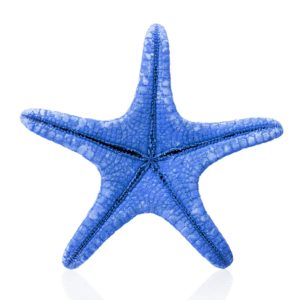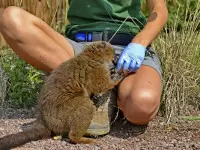
Invertebrate Biologists study all living species that have no backbone - in water and on land.
What Does an Invertebrate Biologist Do?
Invertebrate Biologists are a special type of biologist that examine and study living species that have no backbone (hence the term invertebrate). This will include insects (although insect specialists are called entomologists), some types of fish, reptiles and lizards (herpetologists) and anything else without a spinal column. Typical creatures will include as broad a spectrum as jellyfish, snakes, arachnids (spiders and fleas), flies, butterflies, dragonflies, bees and wasps. This list is representative but not extensive.
Their scope of study can include many things. They may be involved in studying their evolution, their genetic structure and attributes, and how they interact with an inside their ecosystem. They may collect samples for analysis for such things as population monitoring or environmental impact, study their characteristics and environmental interactions. They will be well versed in many aspects of each species, including the right environmental conditions for population boom or bust.
Increasingly, they are expected to understand the environmental and human impact on natural selection and population trends. Some may even contribute to conservation planning, enforcement or development of policy for local or national government.
No matter their role or where they work, they will be expected to have a clear understanding of the scientific process as it pertains to biology, biological sciences. This will include environmental sampling. Increasingly, they need to be able to use the technical tools of the trade, particularly in IT. Examples will include GIS.
Where Does an Invertebrate Biologist Work?
Where they work depends on whether they are involved in research or in practical application of their discipline. They may work in the field collecting samples, monitoring and observing wildlife in its natural habitat. Alternatively, they may work in labs analyzing and compiling data collected by others. This latter group is much more likely to be involved in report writing and policymaking for interested parties. The former group can spend much of their time travelling the world; the latter group are more likely to stay in one place.
Around one third work in state government. They will typically work in environmental monitoring and planning in advisory roles to local government or for state parks and other preserved areas that come under the protection of state government and other local authorities. Around 20% work for Federal government fulfilling much the same roles.
10% work for technical consulting services. These bodies provide independent advice and analysis to private industry and government, often (for example) with developers, giving a conservation assessment. Others may work in medical research. Some of our most recent medical developments have come from studying animal genetics.
Education establishments such as research laboratories and academia employ around 7% of qualified Invertebrate Biologists.
What Is the Average Invertebrate Biologist Salary?
Invertebrate biologists, who fall under the broader BLS category of zoologists and wildlife biologists, earned a median salary of $66,350 as of May 2020. The lowest 10% earned under $41,720 and the highest earned more than $106,320. The highest paying sector was Federal government with an annual median of $81,530.*
Invertebrate Biology Jobs & Job Description
A career as an Invertebrate Biologist is a multifaceted career that studies the enormous world of animals without backbones. While there is extreme diversity in the tasks and requirements for this career, many invertebrate biologist careers include:
- A Bachelor's of Science degree in biological sciences or related field of study
- Ability to work independently and as a contributing member of a team
- Capability to work outdoors in variable weather and environmental conditions, including steep slopes, rough terrain and extreme temperatures
- Perform work indoors in a laboratory, museum or zoo
- Extensive travel may be required and may include travel by watercraft, scuba diving, all-terrain vehicles and hiking
- Knowledgeable in species identification of invertebrates
- Capacity to execute and maintain database information
- Capability to produce technical reports and data logs
- Ability to use, maintain and calibrate equipment in the field for monitoring and studying various aspects of invertebrates, such as population dynamics and species at risk
- Trap various species of invertebrate animals to be identified and analyzed, then safely released back into their natural environment
- Ensure the safety and proper handling of live invertebrate animals
- Participate in pest population control and disease management to maintain species diversity and preservation
- Study, propagate and conserve coral reef populations
A Senior Invertebrate Biologist has extensive knowledge and expertise in the field of invertebrate biology. The tasks of a senior level Invertebrate Biologist can include those of junior Invertebrate Biologists as well as:
- A Master's of Science degree or Ph.D. in biological sciences or related field of study
- Manage, mentor and oversee junior biologists in the field
- Ability to respond to complaints or concerns from the public or fellow employees
- Provide feedback and recommendations regarding these concerns
- Capability to present diverse information on research, observations, and conservation of invertebrates to a range of audiences
- Teach invertebrate biology in educational institutions
- Contribute research and scientific papers to the scientific community
- Develop innovative invertebrate surveying and monitoring methods to be used by biologists
- Design aspects of research projects including budgets, policies and procedures
- Develop new conservation strategies and propagation methods for coral reef populations
- Communicate at conferences, meetings, and seminars
What Is the Job Demand for Invertebrate Biologists?
The job demand for all zoologists and wildlife biologists will grow around 5% between the 2020 and 2030.* It has been projected that more wildlife biologists in general will be required to understand the impact that human action has on invertebrate populations. Much of this research is subject to government funding - central and state, coming from education budgets and science funding. There are no guarantees and cutbacks are expected in the next ten years. Students can improve their employability chances by engaging in fieldwork.
What Are the Education Requirements to Become an Invertebrate Biologist?
At the very least, those who wish to study to become an Invertebrate Biologists need a BA or BS. Biology degrees will often be enough to teach the concepts, scientific method, experiments and background to biological study. Students who take any biology degree are strongly recommended to study minors and electives in relevant subjects such as chemistry, math and physics. Increasingly, environmental studies are important to degree progrmas. This should be enough for most entry-level positions.
Those with master's degrees may find many more paths open to them, including project management and extra responsibilities that graduates armed only with a BA or BS may take many years to develop. Also, the MA / MS programs will help students develop a more in depth understanding of biological concepts and develop their own niche and expertise. If you have an intended thesis or dissertation you wish to pursue, a master's is the best way to follow this.
Doctorate studies are suitable for students who wish to enter into academic research and run their own projects. Should you wish to follow a path in teaching, you should also study a doctoral program.
Invertebrate Biology - Related Degrees
What Kind Of Societies and Professional Organizations Do Invertebrate Biologists Have?
Invertebrate Biology is an internationally important discipline. There are many global groups to aid research of these vital species.
- Xerces Society: This global organization has a mission to promote conservation of invertebrate species and their habitats. They engage multiple groups in promotion of the cause and offer education programs
- International Society of Invertebrate Reproduction and Development: This specialist organization set up in 1975 studies all elements of the reproduction of invertebrate species. Amongst other things, they produce an academic journal
*2020 US Bureau of Labor Statistics salary figures and job growth projections for zoologists and wildlife biologists reflect national data not school-specific information. Conditions in your area may vary. Data accessed September 2021.





